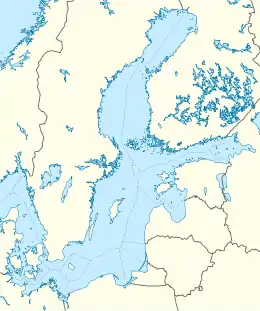57°19′N 20°03′E / 57.32°N 20.05°E

Position of the Gotland Deep in the Baltic Sea
The Gotland Deep (Swedish: Gotlandsdjupet),[1] is a marine depression in the Baltic Sea and, at 248m below sea level,[2] is its fourth lowest point, after the Landsort Deep, Åland Deep (channel of the Åland Sea) and Ulvo Deep (Bothnian Sea). It is noted for having a periodically anoxic environment.[3][4]
It is located between the Swedish island of Gotland and the Latvian west coast and marks the deepest point of the East Gotland Basin.
Cores from the Gotland Deep have provided insights into the climate and geologic history of the Baltic during the Holocene.[5]
See also
References
- ↑ "Gotlandsdjupet". Nationalencyklopedin (in Swedish). Retrieved 20 July 2015.
- ↑ "Steckbrief der Ostsee" [Profile of the Baltic Sea] (in German). Leibniz-Institut für Ostseeforschung Warnemünde [Leibniz Institute for Baltic Sea Research]. Retrieved 10 October 2023.
- ↑ Neretin, Lev N.; Pohl, Christa; Jost, Günter; Leipe, Thomas; Pollehne, Falk (2003). "Manganese cycling in the Gotland Deep, Baltic Sea". Marine Chemistry. 82 (3/4): 125–143, page 125. doi:10.1016/S0304-4203(03)00048-3.
- ↑ Hansson, Martin; Viktorsson, Lena (2022). Oxygen Survey in the Baltic Sea 2021: Extent of Anoxia and Hypoxia, 1960-2021 (PDF). Report Oceanography No. 72. Göteborg, Sweden: Swedish Meteorological and Hydrological Institute. p. See Figure 7, page 10. OCLC 1395446814.
- ↑ Sohlenius, Gustav; Sternbeck, John; Andrén, Elinor; Westman, Per (1996). "Holocene history of the Baltic Sea as recorded in a sediment core from the Gotland Deep". Marine Geology. 134 (3/4): 183–201. doi:10.1016/0025-3227(96)00047-3.
This article is issued from Wikipedia. The text is licensed under Creative Commons - Attribution - Sharealike. Additional terms may apply for the media files.